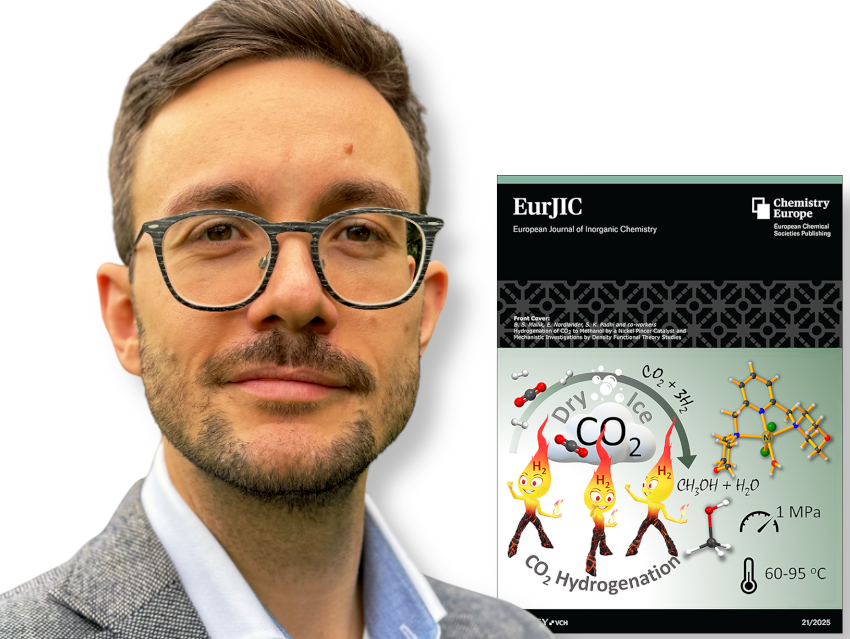Chemistry Europe and Wiley-VCH have named Dr. Axel Straube Editor-in-Chief of the European Journal of Inorganic Chemistry (EurJIC). He succeeds Dr. Preeti Vashi.
Axel Straube studied chemistry at Universität Leipzig, Germany, and Cardiff University, UK, with a brief placement at Uppsala Universitet, Sweden. He obtained his Ph.D. from Universität Leipzig in 2020 under the supervision of Evamarie Hey-Hawkins, having worked on tridentate phosphanes with a redox-active tris(ferrocenyl)arene backbone for redox-switchable catalysis. After a short postdoctoral stint exploring the chemistry of carboranes, Axel joined Wiley-VCH in summer 2021 as an Assistant Editor for ChemistryOpen, ChemistrySelect, and Chemistry – Methods. He was appointed Editor-in-Chief of ChemPlusChem and Deputy Editor of Chemistry – A European Journal in December 2023 before taking over EurJIC in May 2025.
ChemistryViews talked to Axel about his promotion.
What fascinates you about the idea of the journal?
As an inorganic/organometallic chemist by training, EurJIC was always on my radar, although I sadly never managed to publish in it myself—and now it’s too late, except for Editorials.
To this day, I’m particularly impressed by its legacy: While EurJIC was formally launched in 1998, its history dates back to 1868 when the first issue of Berichte der Deutschen Chemischen Gesellschaft (later, more simply, called Chemische Berichte) was published. Together with other journals owned by European chemical societies, such as the Italian Gazzetta Chimica Italiana, EurJIC and our sister journal, the European Journal of Organic Chemistry (EurJOC), are the successors to those individual journals.
To this day, EurJIC and EurJOC are fully owned by Chemistry Europe and give back to the 16 European societies behind them. We are a true society journal, and we continuously partner with our owner societies. I love that, thanks to these strong roots and connections with the societies, we serve as a European forum for a global audience interested in all facets of inorganic chemistry!
What are your main goals for the journal?
From talking to researchers at conferences and at workshops, there is a lot of fondness for EurJIC—but it’s also no secret that metrics such as the Journal Impact Factor don’t mirror this sentiment. Much has been said about how flawed a metric it is, starting with the fact that it is a retrospective, journal-level measure that only focuses on citations in the first two full years after publication. Yet, many of our authors face being evaluated on impact factors, rankings, and other “quality proxies”. My primary objective will be to enhance the visibility of EurJIC as a respected and trustworthy venue for modern inorganic chemistry research, by actively promoting our existing publications and re-engaging both established and emerging scientists to contribute their findings.
We will continue our partnership with our owner societies, for example, through showcasing the contributions of Italian researchers in the 50th edition of the annual meeting of the Inorganic Chemistry Division of the Società Chimica Italiana (SCI). The biannual EurJIC-Wöhler Young Investigator Prize is again open for nominations, and we are looking into further partnering with the early-career inorganic chemistry divisions of our partner societies to showcase emerging talents where we can.
What do you enjoy doing outside of work?
Nothing clears the head quite as well as a long hike through the beautiful forests and mountain ranges around Weinheim. The Odenwald is right around the corner, and the Black Forest, the Westerwald, and the Pfälzerwald aren’t far either.
If I’m not hiking somewhere, I’m most likely found singing in different (chamber) choirs, touring Germany and beyond—my next trip will take my men’s choir to the US, and I’m much looking forward to exploring the culture of barbershop and university choirs!
That sounds very exciting. Thank you very much for the interview.
Also of Interest
- YourJIC, MyJIC – OurJIC!,
Axel Straube,
Eur. J. Inorg. Chem. 2025.
https://doi.org/10.1002/ejic.202500365




